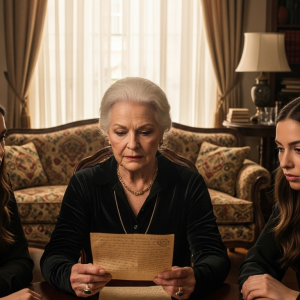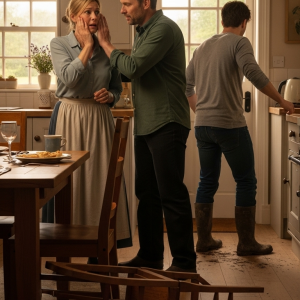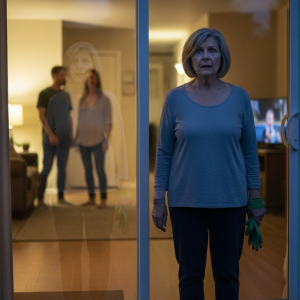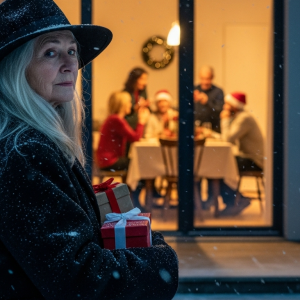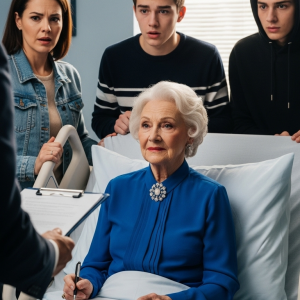At my son’s funeral, while the scent of lilies still hung heavy in the air, she appeared. Veronica Pike, the woman who had vanished fifteen years ago, walked in to claim the $24 million he left behind as if it were her birthright. My chest tightened, and the whispers of the mourners became a thousand tiny cuts.
I stood there, a statue carved from grief and fury, realizing this was a betrayal not just against me, but against the very memory of my son. What was about to unfold would tear the mask from every face in that chapel, leaving no corner for a lie to hide.
She strode through the chapel doors in four-inch heels, her black dress sharp enough to draw blood. A smirk played on her lips, freezing the solemn room. Her voice, loud and rehearsed, shattered the peace. “I am here to claim what is mine. The $24 million estate my husband, Grant, left behind. As his lawful wife, I have every right to it.”
The air was sucked from the room. Gasps echoed, and stunned faces turned to one another. But I kept my eyes fixed on the polished mahogany coffin. My son’s name, Grant Hullbrook, was etched on a brass plate, gleaming in the candlelight. He hadn’t been in the ground ten minutes, and she was already clawing at his legacy.
It wasn’t sadness that struck me. It was a cold, quiet fury that settled deep behind my ribs. I didn’t turn to look at her. Not yet. I pressed a hand against my dress, willing it to stop shaking. My late husband always said I had the patience of a stone wall. That day, I would need every inch of it.
Veronica’s lawyer, a young man radiating nervousness, fumbled with a blue folder. His voice trembled as he cited marital status and survivor’s rights, referencing a policy he clearly hadn’t read. He had no idea she’d signed away every right in their divorce settlement over a decade ago.
To my left, my lawyer, Ruth Cer, gave me a subtle nod. She was a silent storm, already pulling a file from her bag. But her eyes met mine and conveyed a clear message: Not yet. Wait for the right moment.
The whispers grew louder, a venomous tide rising in the pews. Veronica’s entrance hadn’t just broken the silence; it had shattered the pretense of dignified mourning. I finally turned to face her. Her eyes met mine with the cold confidence of a predator who believed she had already won.
“I am not here to fight,” she declared, her voice ringing with false magnanimity. “I am simply here to collect what is legally mine.”
My voice, when it came, was calmer and colder than hers. “You are not his wife. Not anymore.”
For a fleeting second, her confidence wavered. Her lawyer whispered frantically, but I saw the flicker of doubt in her eyes. She had gambled on my grief, hoping I would be too distraught to fight back. She had mistaken this sacred space for her stage.
Then, Ruth stepped forward, silent as a shadow. She handed the church officiant a copy of the divorce decree—stamped, sealed, and notarized. It contained a full waiver of any future claim to assets. The truth was there in black and white, and the ensuing hush was more damning than any shout could have been.
Veronica stood frozen, her eyes darting across the room, searching for an ally. None came. I felt no triumph, only a grim resolve. I had raised my son alone after she left him drowning in medical debt and heartbreak. I was there for every chemo session, every surgery, every night the pain outran the medication. She had been a ghost, summoned only by the scent of money.
As I turned to leave the chapel with Ruth at my side, I didn’t look back. I heard someone whisper my name with pity, another mutter, “Justice.” But I didn’t need their sympathy. This wasn’t justice. Not yet. This was only the beginning.
The wind whipped around us as we descended the stone steps of the chapel. Ruth handed me a manila envelope without a word. I tucked it under my arm, knowing its contents would soon be needed. The funeral director met us at the curb, flustered and apologetic. “Death doesn’t always bring dignity,” I told him, and he had no reply.
In the car, I stared out the window, my hands clasped tightly in my lap. My breathing was slow, not calm, but controlled. There is a profound difference. Eleven minutes later, we were in the conference room of Ruth’s law firm. The door clicked shut, sealing us in.
Ruth laid two documents on the table. The first was my son’s final will, signed nine months before he died. I remembered his hand, thin but steady, as he signed every page. He left everything to me: the company stock, the property, the insurance payout, and the intellectual rights to an app he’d designed in his final months. Veronica’s name was absent, erased from his final chapter.
The second document was the divorce settlement, with its ironclad waiver of future rights. No loopholes, no ambiguity. “Veronica has no legal ground,” Ruth said, her voice measured, “but she’s audacious. She will escalate this.” I nodded, my jaw clenched. If she wanted a war, I would meet her on the battlefield.
I scanned the estate inventory. Bank holdings, shares, the lakehouse, the condo. Then I saw the last item: a private video letter, recorded by my son and stored under attorney-client protection. I hadn’t known. Ruth tapped the folder. “He knew she might come back. He left us ammunition.”
We drove to the courthouse for a pre-arranged meeting with a probate judge. Given the estate’s size and the clear conflict, the judge agreed to an emergency review. Within an hour, a temporary protection order was issued over all assets, flagging Veronica’s claim as invalid upon filing.
As we left, the sky had turned a stormy grey. Ruth’s phone rang. It was Veronica’s lawyer, his voice cracking on speakerphone, requesting a meeting. Ruth’s reply was ice. “All communication will be in writing. And be advised, your client’s disruption of a religious service will be duly noted.” I remained silent. The time for quiet deference was over.
That evening, I opened the video letter. My son sat in his favorite chair, his voice calm and clear. He spoke of the foundation he wanted me to build, of scholarships and community projects. Then, he looked directly into the camera. “Mom, if she comes back, stand your ground. Not just for me, but for yourself. She walked away from me. You never did. I chose you.”
I played that last part twice. The words settled over me, not as a burden, but as a shield. I opened my desk drawer and wrote down three names—three people who knew the truth. One had hospital records, another had development contracts, and the third had emails that were never meant to see the light of day. This was not about revenge. It was about protecting his story.
By the next morning, word had spread. My phone buzzed with calls from distant relatives and old neighbors, their voices laced with a hesitant curiosity. They weren’t sure which side to believe. I didn’t return their calls. Instead, I sat with my coffee, watching the sun rise over the yard where I’d planted forget-me-nots during his first round of chemo.
The quiet was shattered around 10 a.m. Veronica posted a cropped, old photo of my son. The caption read: Heartbroken to say goodbye to the love of my life. May justice be served. The comments flooded in—sympathy emojis, words like “brave” and “tragic.” She was painting a narrative, and people were buying it.
This was no longer just a legal fight. It was a battle for public perception. I texted Ruth, whose reply was instant: Already monitoring. We prepare our response, not our reaction.
At noon, I met Ruth in a soundproof room at a private library. She laid out a three-part plan. First, solidify our legal position. Second, gather all witness statements and evidence. Third, and this was new, was “the event.” Ruth wanted to host a public dedication for the foundation my son had planned. “The best defense isn’t a courtroom,” she argued. “It’s a crowd.”
We set the date for three days later at City Hall. The mayor had already supported the foundation’s groundwork months ago. We weren’t staging a spectacle; we were continuing my son’s work. I knew Veronica would be there, and I had to be ready.
That evening, my son’s former CFO, Priya, met me at his old, darkened office. She handed me a flash drive containing the last two months of his private emails. That night, I opened a file he’d saved as a draft but never sent. It was an email to me.
Mom, if you’re reading this, I’m gone. And if she shows up, remember you are the only one who stayed. You were there when I was more tubes than skin. Don’t let her rewrite what we both lived. I chose you. Never her.
Any lingering doubt I had vanished. My grief had been a quiet, private pain. Now, it had a purpose. In three days, I would stand in that room, and the story told would be his.
Three days after the funeral, I walked into the City Hall auditorium through a back entrance. The room was already filled with press, investors, and community leaders. The event was billed as the launch of the Hullbrook Memorial Foundation, but everyone knew it was a reckoning.
At 10:05 a.m., Ruth stepped to the podium. “We are here to honor the vision of a man who lived with quiet brilliance,” she began. “What you will see today is not about loss. It is about intention. It is about truth.”
The lights dimmed, and the screen lit up. It was a video of my son, recorded five weeks before his death. He looked tired but focused. His voice was steady. “If you are watching this, I’m not around anymore. But I wanted to explain my choices in my own words, so there would be no confusion.”
He detailed his illness, his vision for the foundation, and his decision to leave everything to me. “She left,” he said plainly. “When I needed her most, she was gone. When I built something worth returning for, she came back. I cannot allow that to define my legacy. I am choosing the person who never left.”
The room was utterly silent when the video ended. I walked to the podium, my steps slow and deliberate. I announced the foundation’s first scholarship recipients and STEM grants. Then, I addressed the rumors head-on.
“Some of you may have seen posts online. I will not respond to gossip. I will respond with evidence.”
The screen displayed dated emails from my son, documenting his revised estate plans. Next came the scanned divorce decree, the waiver of rights highlighted in yellow. The final slide was a screenshot of an email Veronica had sent a friend weeks before the funeral, forwarded to Ruth anonymously. It read: I don’t care what it takes. I’m going back to get what should have been mine. If his mother wants a war, I’m ready.
I looked out at the audience. “That was her story. This is the truth. This legacy belongs to the man who earned it.”
Applause started, then grew to fill the room. I saw Veronica in the back row, sunglasses failing to hide her tight-lipped fury. When the lights came up, she stood and left, her heels clicking loudly on the floor, a desperate cry for attention. No one turned to watch her go.
The next morning, Ruth sent a single text: Stay off social media. Veronica had released a video, a spliced and manipulated clip of my son, making him sound like he regretted changing the will. It was a fabrication, but subtle enough to sow doubt. She had titled it, “Let The Truth Be Heard.”
We didn’t panic. We responded. First, we released the full, unedited video of my son, timestamped and uncut. Second, Priya released archived emails from my son’s business partners, showing a pattern of his disappointment with Veronica. In one, he wrote: She reached out again… not to ask about my health, but to find out if the IPO went through. I’m tired of pretending.
Our press briefing was quiet and clinical. No podium, just a projector and printed packets of facts. Ruth opened with a single sentence: “Misinformation is dangerous. Here is the truth.” We played the original video. We distributed the evidence. We answered questions with facts, not soundbites.
Veronica’s video was quietly taken down by several community blogs. But it wasn’t enough. She filed a motion to contest the will, claiming my son lacked mental capacity and that I had coerced him. The accusation was a blade to the heart, twisting every moment I had cared for him into something monstrous.
I read the motion at my kitchen table, the same table where I had once shaved his head when his hair fell out from chemo. They called me ruthless. They weren’t there when I held his hand as he screamed in pain. They weren’t there the day he asked me, with perfect clarity, to ensure she never got a penny.
We prepared our rebuttal, a mountain of affidavits, testimonies, and documents. But before filing, I wrote a public letter for the foundation. I am not my son’s voice, but I am the echo of what he believed. He believed in truth that did not need to shout to be heard.
The court’s ruling came on a Wednesday morning. Motion to contest: dismissed in full. The judge found no evidence of coercion, describing Veronica’s claims as “unfounded, speculative, and intentionally misleading.”
That last phrase was the nail in her coffin. The court scheduled a hearing to review sanctions against her and her legal team for abusing the system. The judge denied her request to have the hearing closed to the public. I decided I would be there.
I sat in the back row as the judge methodically dismantled her case piece by piece. Her edited video, her false affidavits, her financial history. When her lawyer claimed she had acted out of grief, the judge’s voice was like steel. “The grief of losing a man you abandoned does not excuse the manipulation of this court.”
Sanctions were issued. Her lawyer faced review from the state bar. Veronica was ordered to pay all our legal fees, and her accounts were frozen. I watched her face. It remained a mask, but her hands tightened and untightened, a silent testament to her unraveling. As I left, she turned slightly. In her eyes, I saw not hatred, but the hollow void of a person who had lost a war of her own making.
A week later, I received a handwritten letter. I need five minutes, it said. I agreed to meet her at a public greenhouse, on neutral ground. She was sitting near the orchids when I arrived.
She didn’t apologize. She said she was angry—angry that she had been written out of her own history, that the world remembered her only as the woman who left. “I thought I could reclaim a piece of that story,” she confessed. “Not for the money. For relevance.”
I let her finish. Then I told her the truth. “Being forgotten is not a punishment. It is a consequence. You disappear from people’s lives when you choose to disappear from their pain. Legacy is not built through drama. It’s built through presence.”
She said she had no plan left, that the court orders had wiped her out. I didn’t offer comfort, but I didn’t offer cruelty either. “This will be the last time we speak,” I said. “If you ever approach my family or the foundation again, I will respond with the full force of the law.” She just nodded, a slow, almost imperceptible motion. I walked away and didn’t look back.
That was the end of her fight. The fallout was quiet but absolute. A fraud investigation, sparked by a state auditor, uncovered a trail of shell nonprofits and ghost donors. She was stripped of her right to operate any nonprofit in the state, fined heavily, and her passport was revoked. Even her own daughter released a statement of estrangement.
One day, I found a crumpled photo in an envelope she must have left for me. It was of my son as a small boy. Beneath it, a note: You’ve taken everything. I have nowhere left to go. I placed it in the back of a drawer. There was no joy in her collapse, only the stark clarity of a truth that had finally surfaced. A person who builds her life on lies cannot blame others when the walls come down.
I accepted a position on a city advisory council, helping older women navigate financial and legal conflicts. In their quiet faces, I saw versions of myself. I told them simply that clarity is not cruelty, that boundaries are not betrayal, and that speaking the truth does not make you hard—it makes you whole.
I never mentioned Veronica’s name again. She had become irrelevant. The war was over. I sat on the bench at the cemetery, not in mourning, but in restoration. The sun was low, casting long golden lines across the ground. There was no vengeance left in my chest, only space. Quiet, sacred space. And I knew that whatever came next would begin from here.
